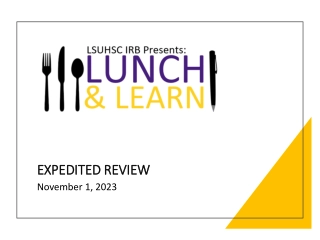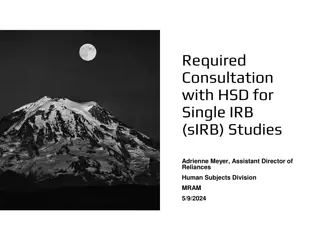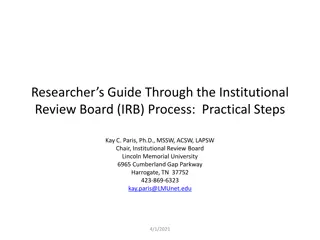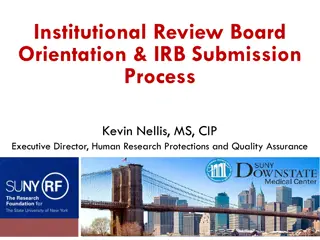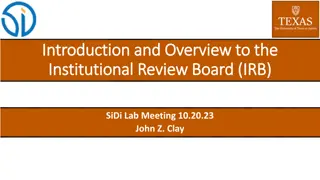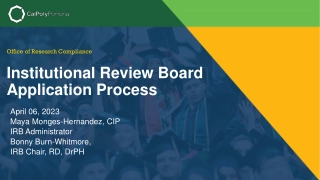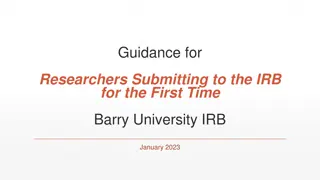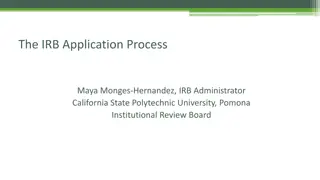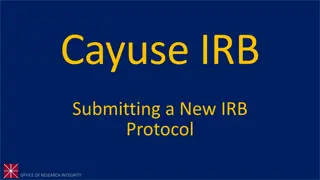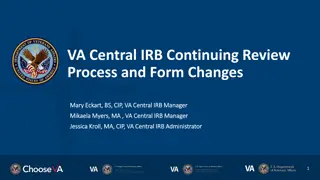Understanding IRB Review Process for Research Studies
The content provides an overview of the IRB review process for research studies, including what necessitates IRB review, the levels of IRB review (exempt, expedited, full board), examples of full board research, and criteria for an Investigational New Drug.
Download Presentation

Please find below an Image/Link to download the presentation.
The content on the website is provided AS IS for your information and personal use only. It may not be sold, licensed, or shared on other websites without obtaining consent from the author. Download presentation by click this link. If you encounter any issues during the download, it is possible that the publisher has removed the file from their server.
E N D
Presentation Transcript
FULL BOARD REVIEW FULL BOARD REVIEW December 6, 2023
Objectives Remind study teams what does require review by the IRB Describe the levels of IRB review Define Full Board Review Outline the IRB review process for Full Board research 2
REFRESHER: Does the Study Require IRB Review? If the study meets both of the following definitions, then it requires IRB review: Is it Research? A systematic investigation, including development, testing, and evaluation, designed to develop or contribute to generalizable knowledge (HHS Common Rule) Any experiment that involves a test article and one or more human subjects, and that either must meet the requirements for prior submission to the Food and Drug Administration (FDA) Does it involve Human Subjects? A living individual about whom an investigator conducting research: A. Obtains information or biospecimens through intervention or interaction with the individual, AND uses, studies, or analyzes the information or biospecimens; OR B. Obtains, uses, studies, analyzes, or generates identifiable private information or identifiable biospecimens (HHS Common Rule) An individual who is or becomes a participant in research, either as a recipient of the test article or as a control. A subject may be either a healthy individual or a patient (FDA) 3
Levels of IRB Review There are three levels of IRB review for human participant research. Each category is different in the level of scrutiny and review procedures required. Exempt Expedited Full Board Exempt from the requirements of Common Rule but not exempt from ethical considerations Research involving minimal risk* Greater than minimal risk to subjects Fits one or more of the 8 Exempt Review Categories Fits one or more of the 9 Expedited Review Categories Not covered under other review categories Limited IRB Review may apply Reviewed by fully convened Board Does not mean fast *Minimal Risk: The probability and magnitude of harm or discomfort anticipated in the research are not greater than those ordinarily encountered in daily life or during the performance of routine physical or psychological examinations or tests 4
Examples of Full Board Research Common examples include research involving greater than minimal risk procedures such as: Clinical Trials involving investigational drugs, biologics, and devices Studies involving disclosure of information that could require mandatory legal reporting (e.g., child/elder abuse, etc.) Studies involving deception Studies involving vulnerable populations, per federal regulation Children Prisoners Pregnant women and neonates Research taking place internationally 5
What is an Investigational New Drug? An Investigational New Drug (IND) is a drug or biological drug that has not been approved for general use by the FDA. It is used in a clinical trial to investigate its safety and efficacy. The term also includes biological products that are used in vitro for diagnostic purposes. An IND application is a request for authorization from the FDA to administer an investigational drug or biological product to humans. 6
Three Types of INDs Research IND: study of an unapproved drug, an approved product for a new indication, or an approved product on a new patient population Emergency Use IND: allows for use of an unapproved drug in an emergency situation that does not allow time for submission of an IND or when a patient does not meet inclusion criteria for an approved research IND Treatment IND: submitted for experimental drugs that show promise in clinical testing for serious or immediately life-threatening conditions (usually approved towards the end of a clinical trial) 7
What is an Investigational Device & an Investigational Device Exemption? An investigational device is a device that has not been cleared for marketing by the FDA. It is used in clinical studies in order to collect safety and effectiveness data. An Investigational Device Exemption (IDE) application permits a device to be shipped lawfully for the purpose of conducting investigations of the device without complying with other requirements of the Food, Drug, and Cosmetic Act (FD&C Act) that would apply to devices in commercial distribution. 8
IDE Types IDE Abbreviated IDE IDE Exempt Involves an Investigational Device; and, Used in clinical research investigation; and, Intended to design, cure, mitigate, treat, or prevent disease; and, Intended to affect the structure or function of the body; and, Device is deemed significant risk (SR) Involves an Investigational Device; and, Used in clinical research investigation; and, Intended to design, cure, mitigate, treat, or prevent disease; and, Intended to affect the structure or function of the body; and, Device is deemed non- significant risk (NSR) Involves a legally marketed device used in accordance with labeling; or, Diagnostic device that meets the requirements of 809.10(c); or, A device undergoing additional testing; or, A device intended solely for animal use 9
Classifications of Devices Significant Risk (SR): Intended as an implant and presents a potential for serious risk to the health, safety, or welfare of a subject; Purported or represented to be for a use in supporting or sustaining human life and presents a potential for serious risk to the health, safety, or welfare of a subject; For a use of substantial importance in diagnosing, curing, mitigating, or treating disease, or otherwise preventing impairment of human health and presents a potential for serious risk to the health, safety, or welfare of a subject; Otherwise presents a potential for serious risk to the health, safety, or welfare of a subject. Non-Significant Risk (NSR): One that does not meet the definition of a significant risk device. 10
Informed Consent for Full Board Studies BELMONT REPORT Voluntary informed consent should be obtained from participants for any exempt research where the investigator will be collecting data through interaction with participants. Respect for Persons Beneficence For Full Board research, the standard requirements for informed consent (or its waiver, alteration, or exception) apply. Justice Templates for Consents can be found on the IRB website. 11
How to Submit a Full Board Application Start a New Protocol in Kuali Protocols and select Full Board under Protocol Type. Additional instructions for submitting a study for exempt determination are available in the Kuali Quick Guides found on the IRB website. 12
When to Submit a Full Board Application Committee meetings are typically held on the 3rd Wednesday of each month. IRB applications for full committee review must be received by the last working Wednesday of the month prior to the meeting date. In general, researchers should allow sufficient time for the pre-review process to ensure that submission materials are adequate for IRB review. Only complete and consistent submission materials will be assigned to a meeting agenda for review. 13
IRB Review Process Submission of the Application to the IRB Full Review or Administrative Review Initiation of IRB Application via Kuali If Changes Needed, Application Returned to Study Team Review is Presented at Convened Meeting Assignment of Board Reviewer Designated IRB Member Issues Approval Study May Begin 14
Possible Outcomes of a Full Board Review Approve When all criteria for approval are met Modifications Required to Secure Approval Minor modifications required prior to approval The Chair or designated reviewer can review changes Defer Significant modifications required prior to approval The convened Board will have to review all modifications Disapprove 15
Save the Date! January Lunch & Learn Date: Time: Topic: January 10, 2024 12:00 PM Informed Consents 17



